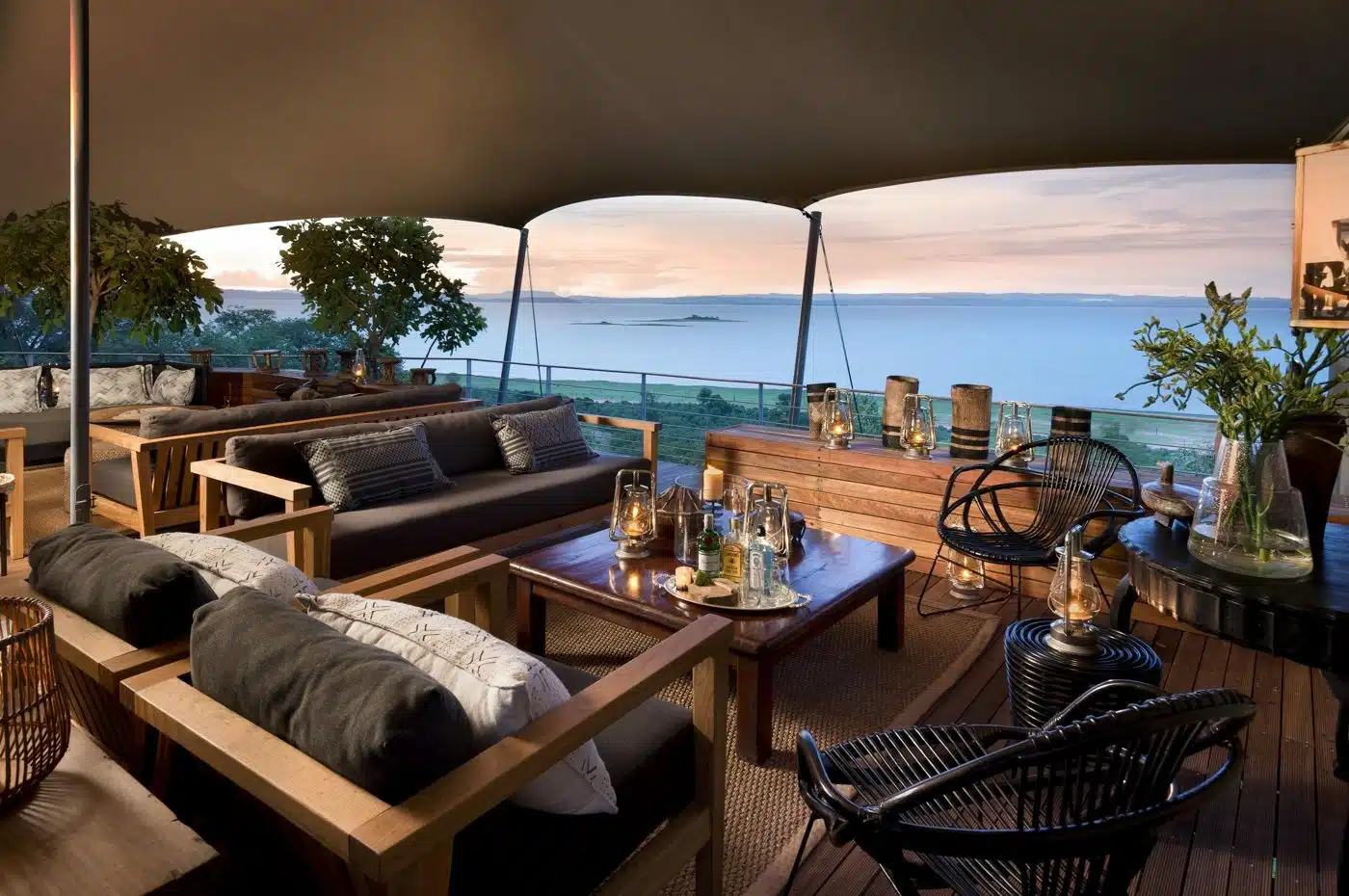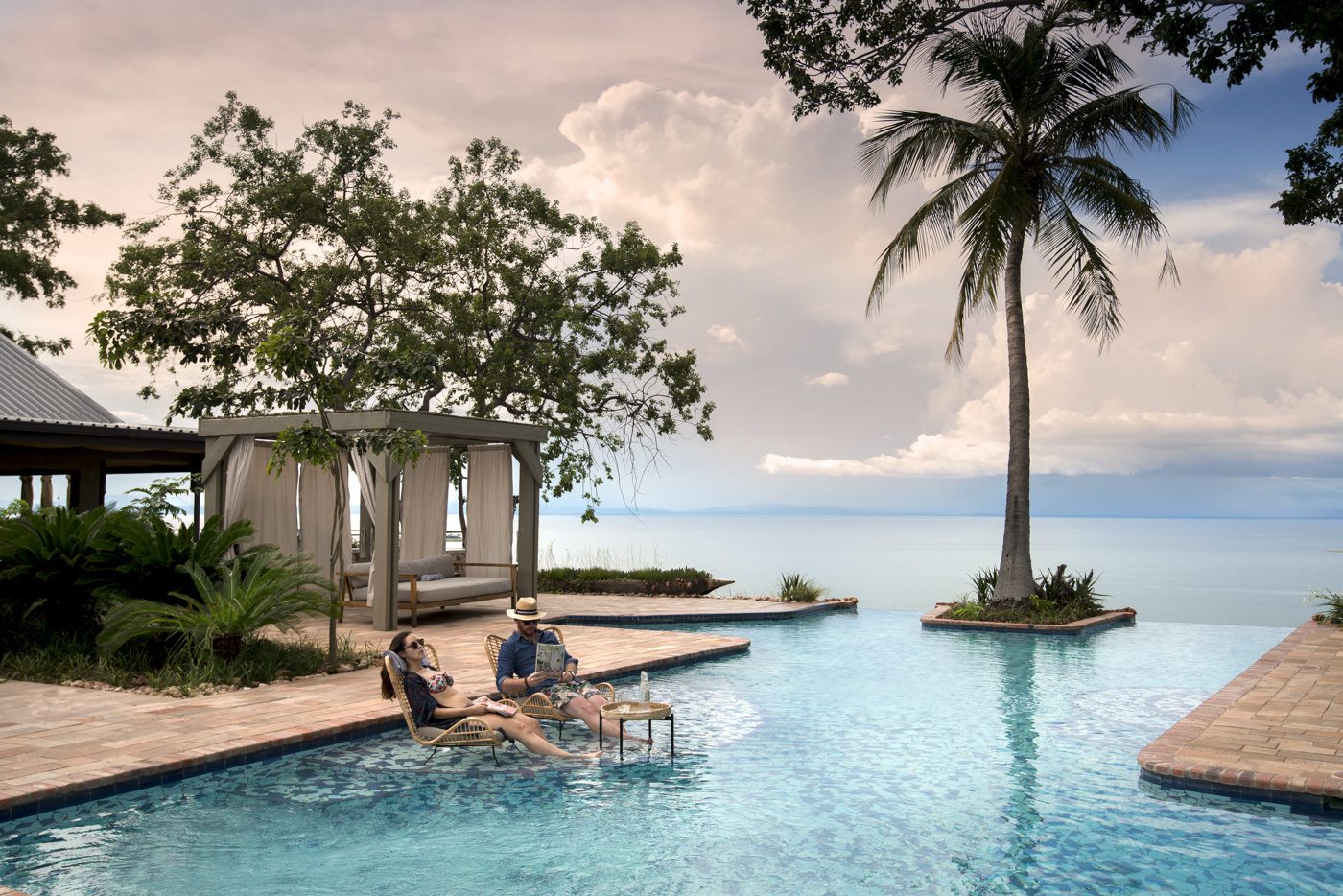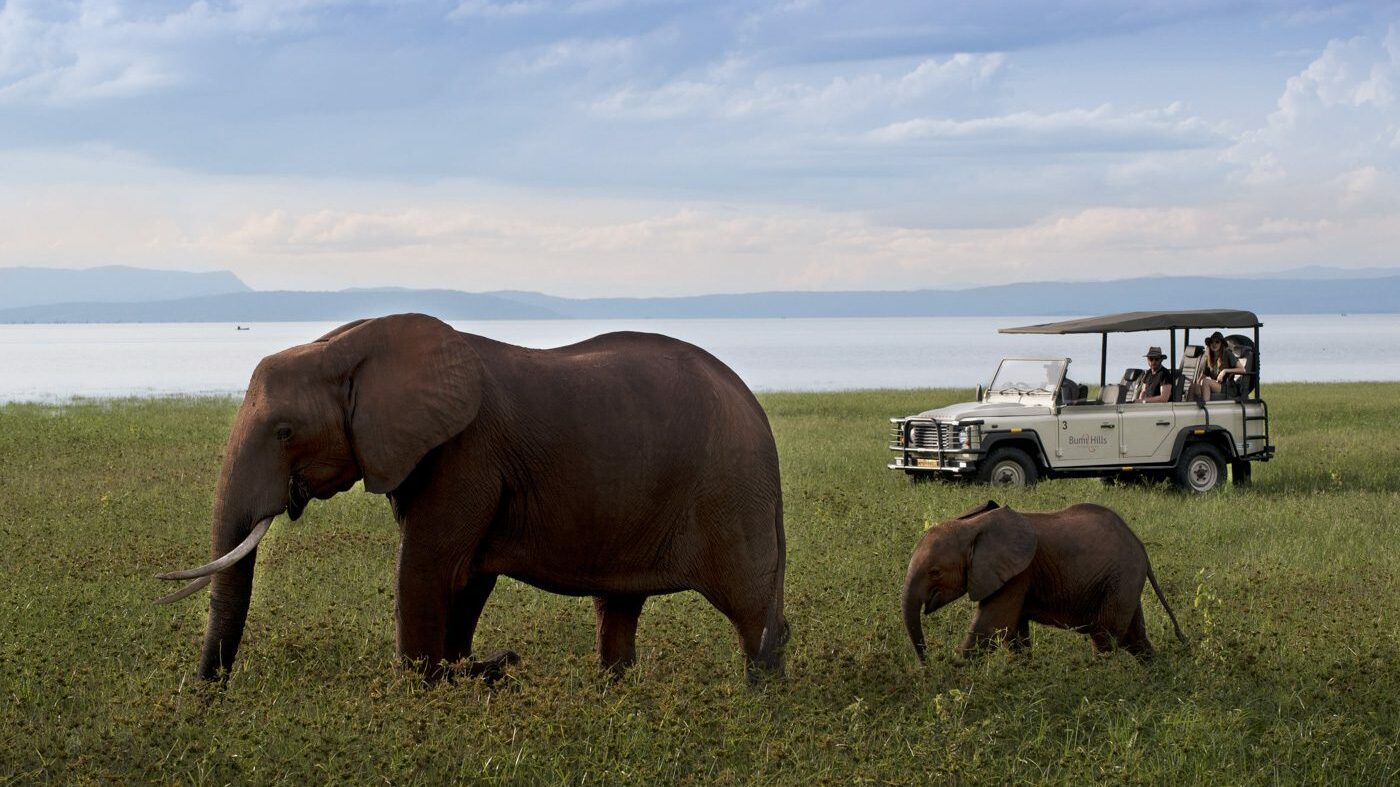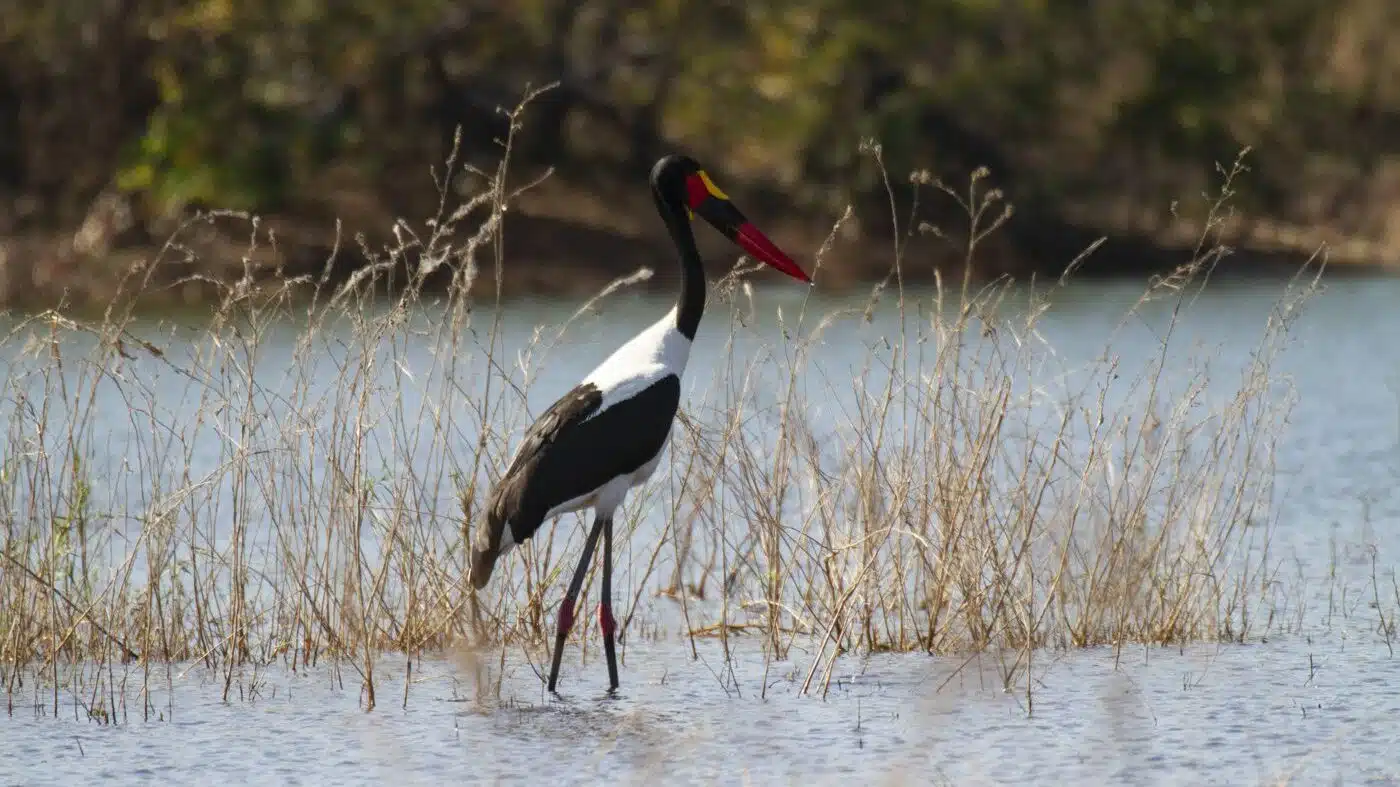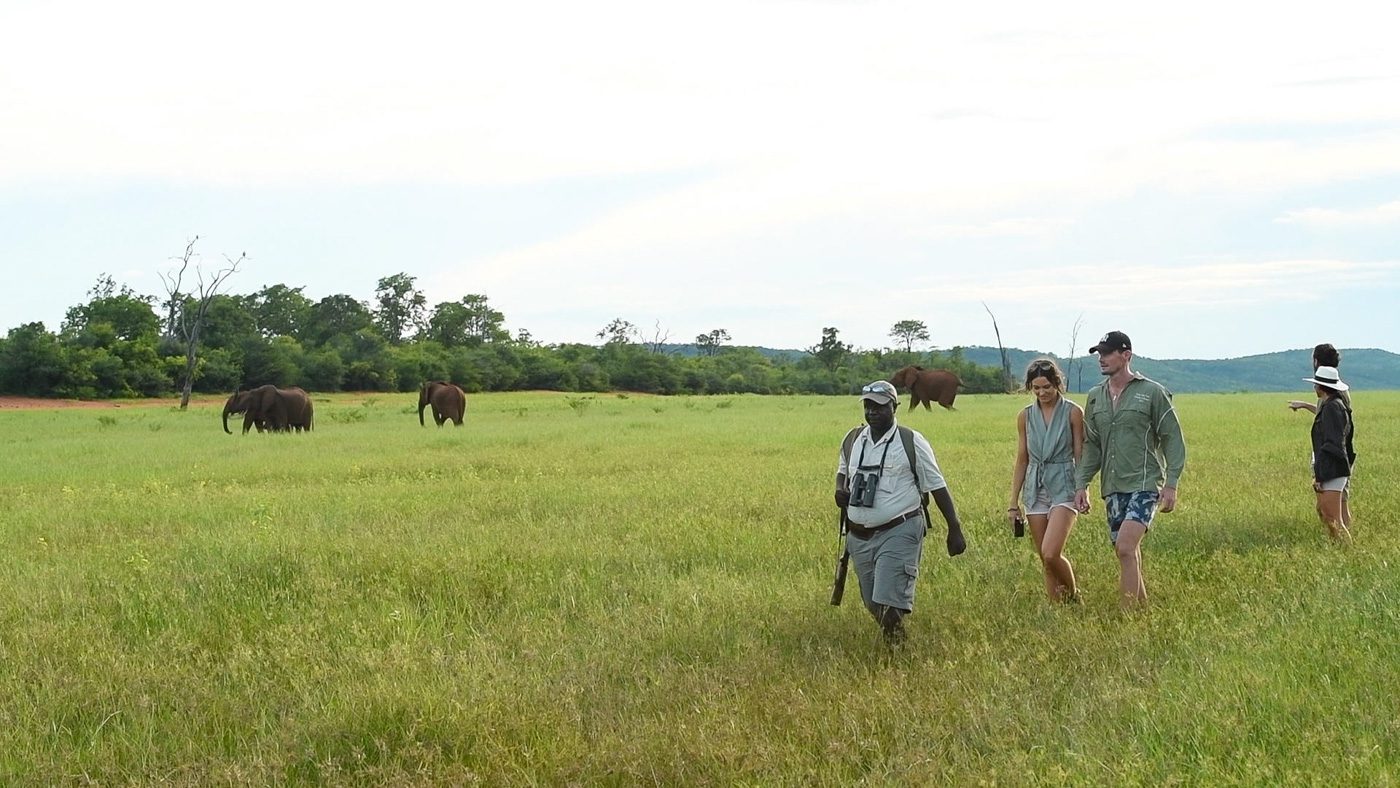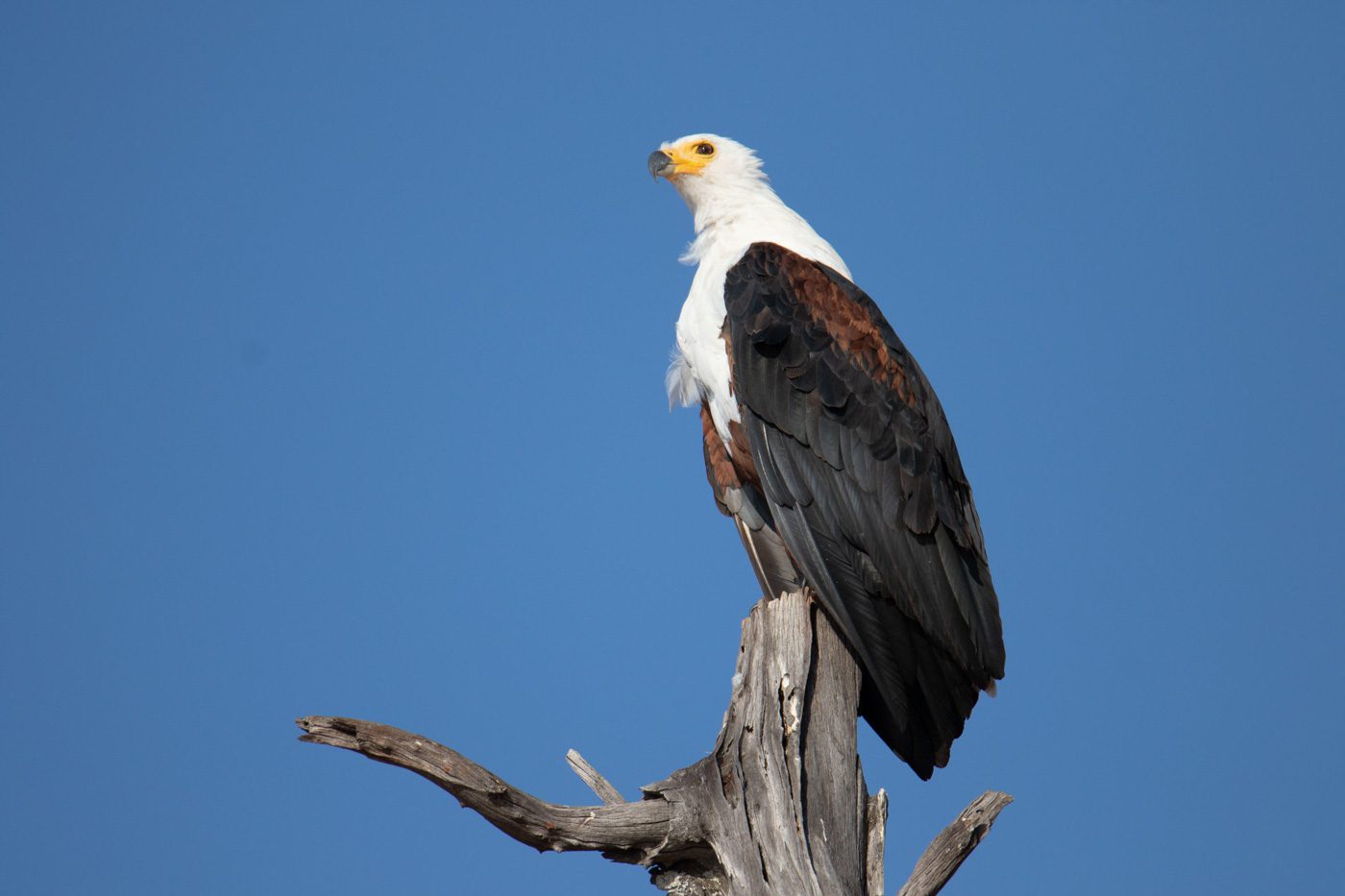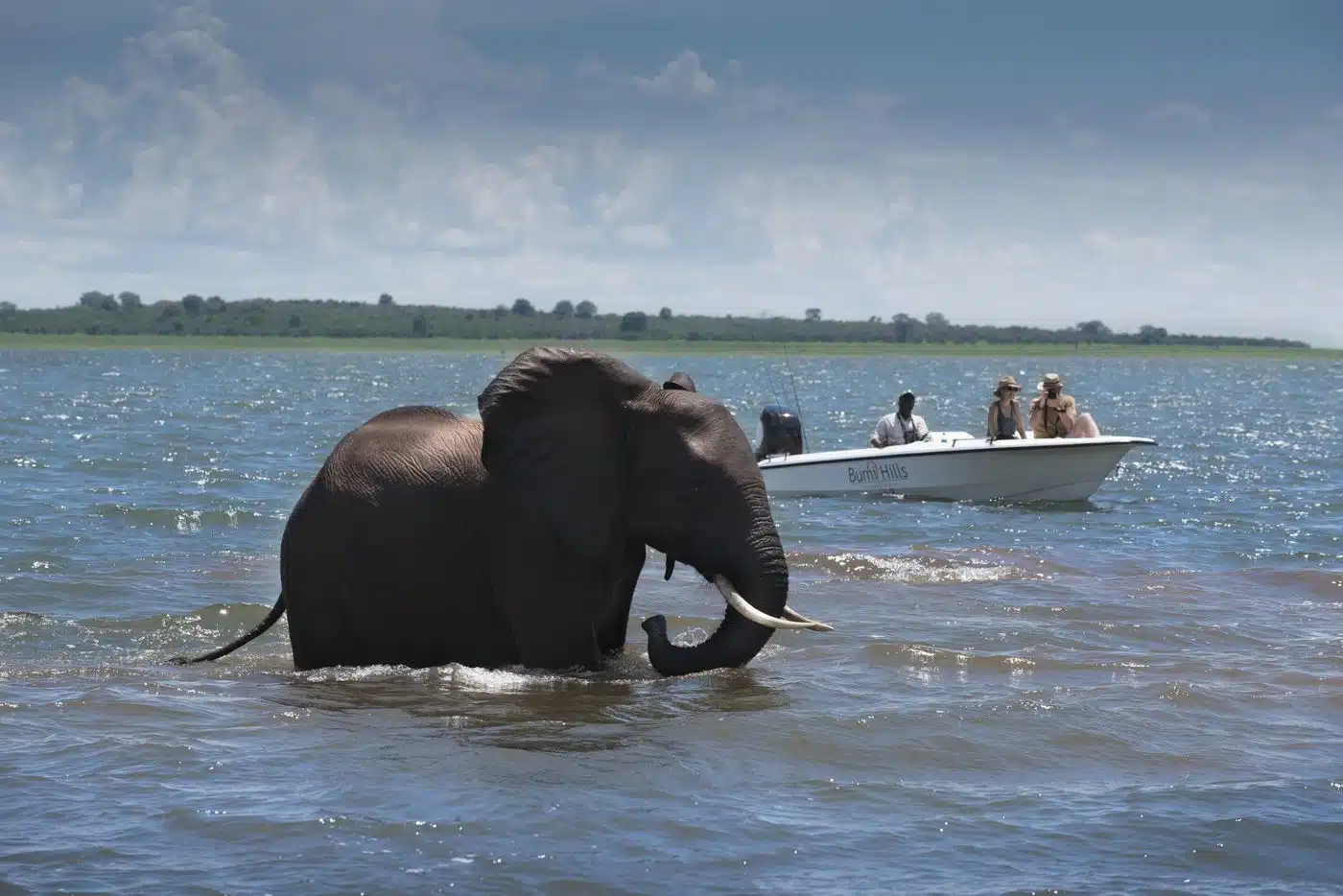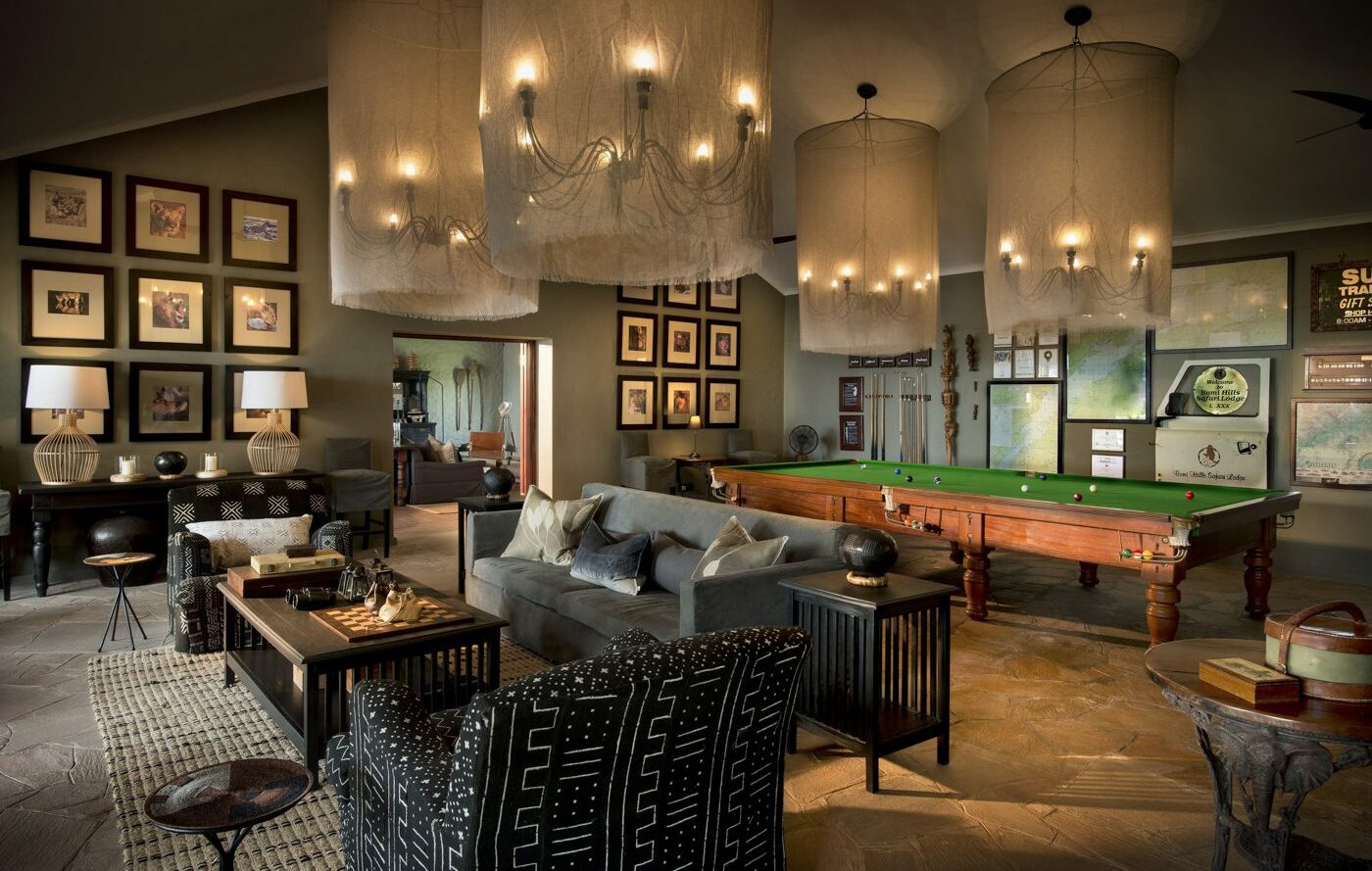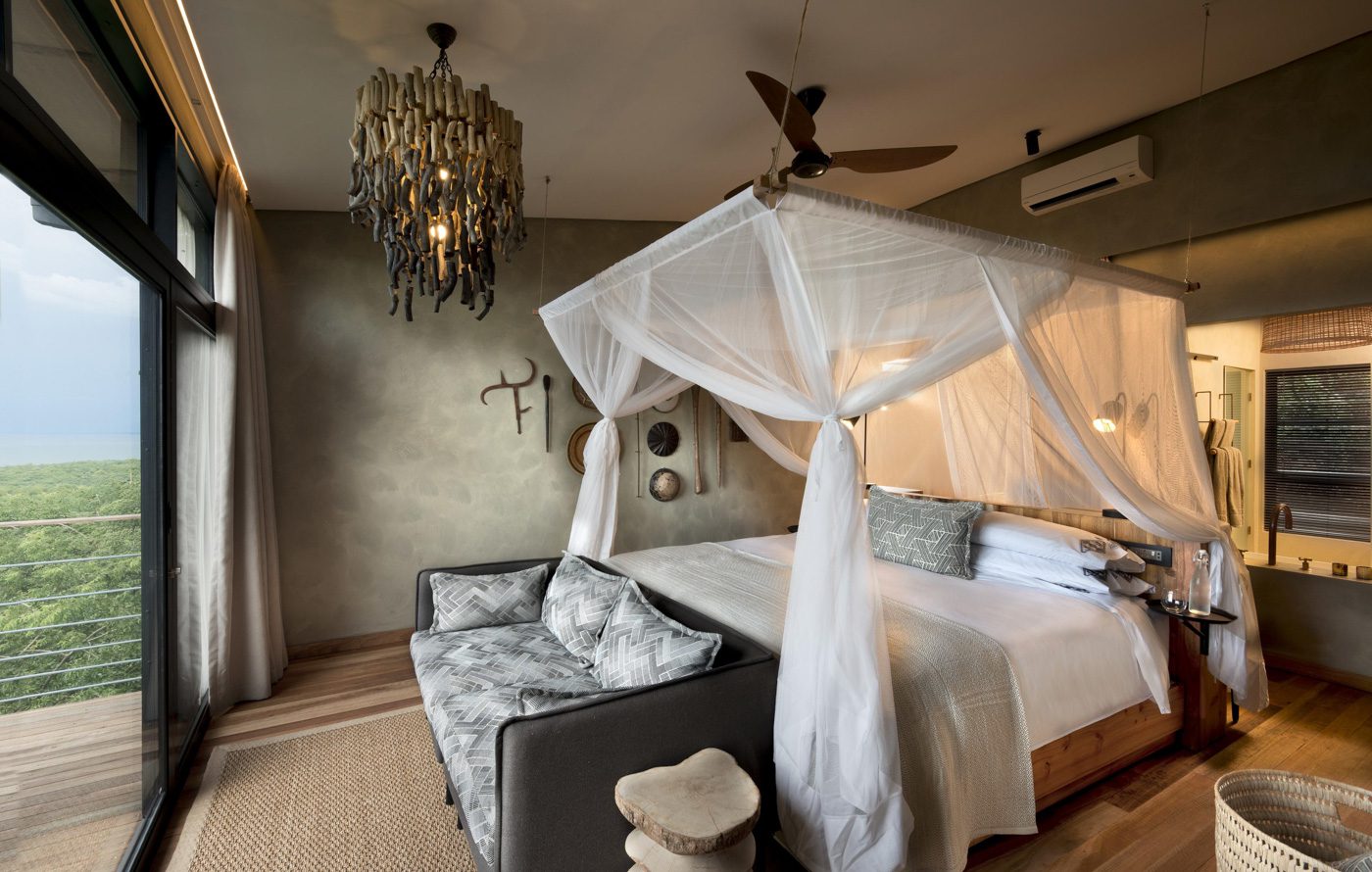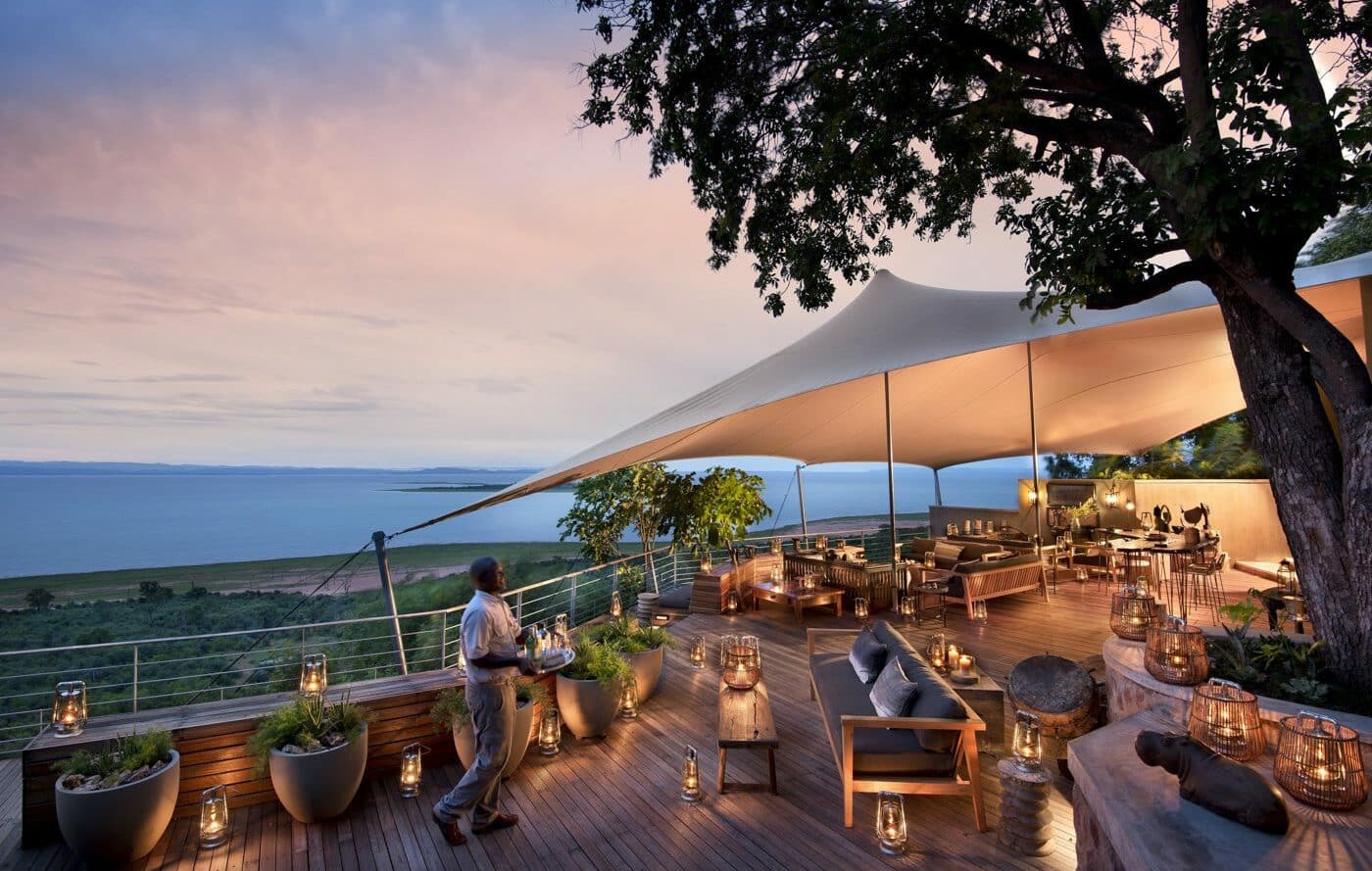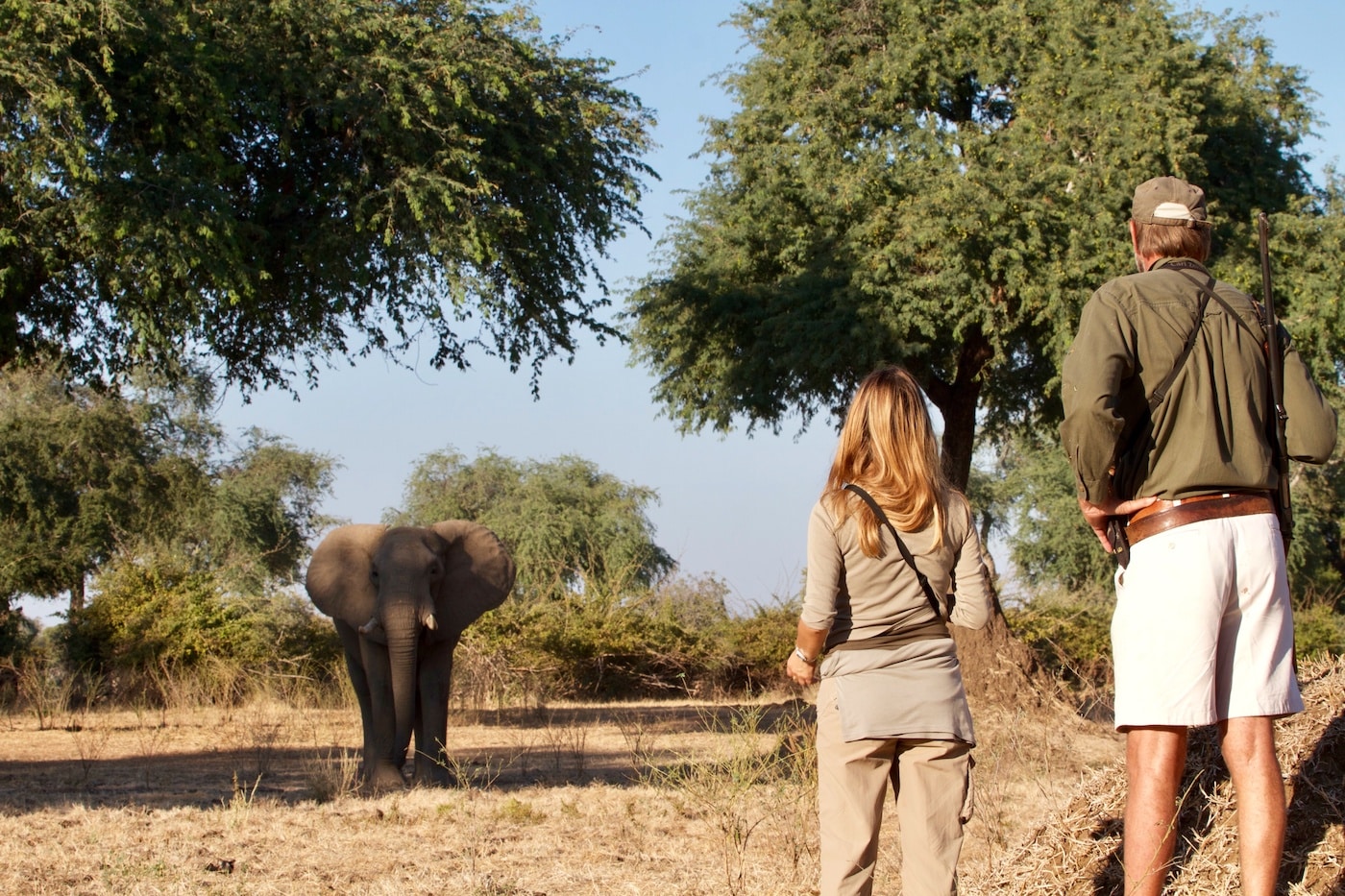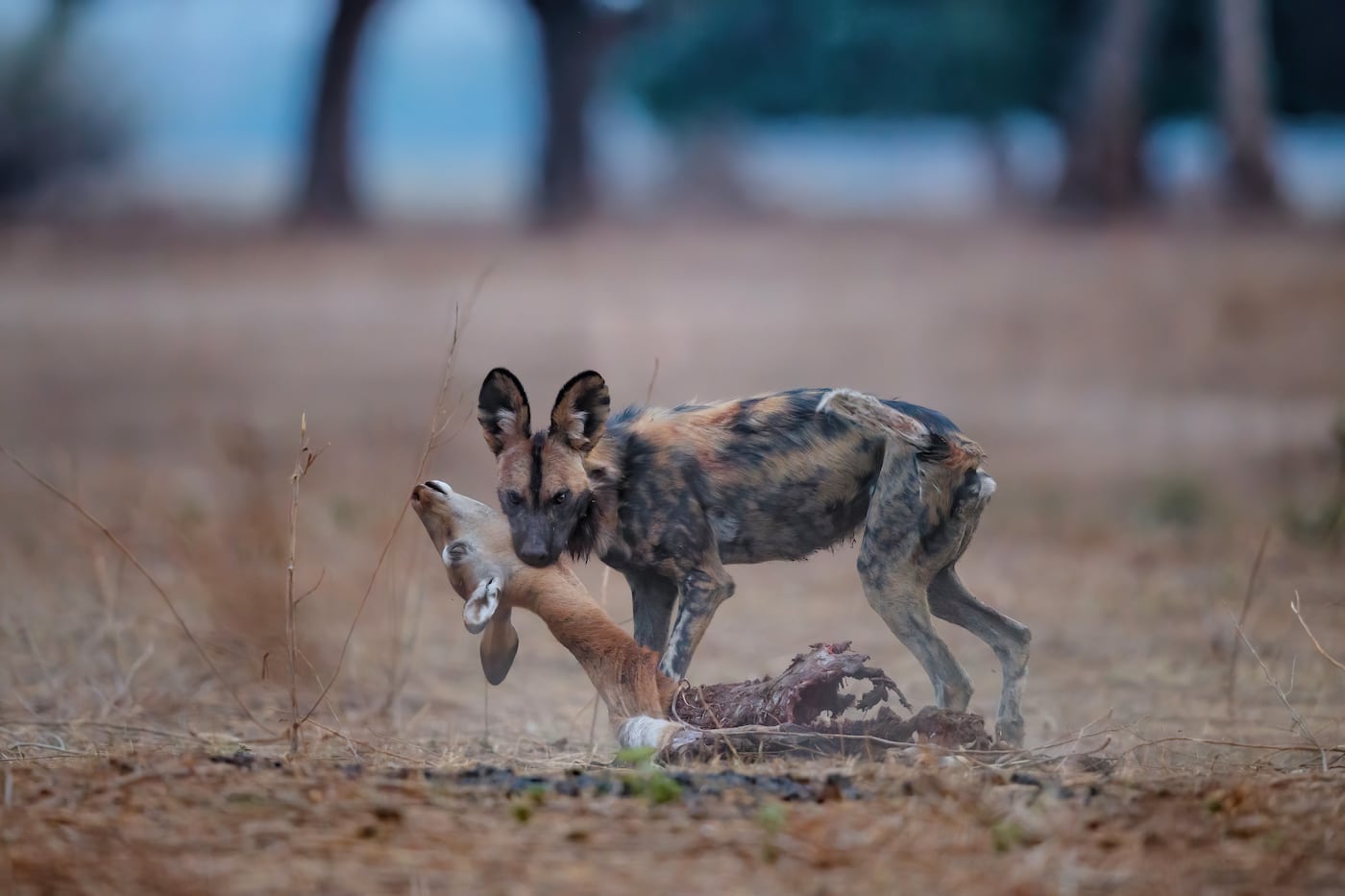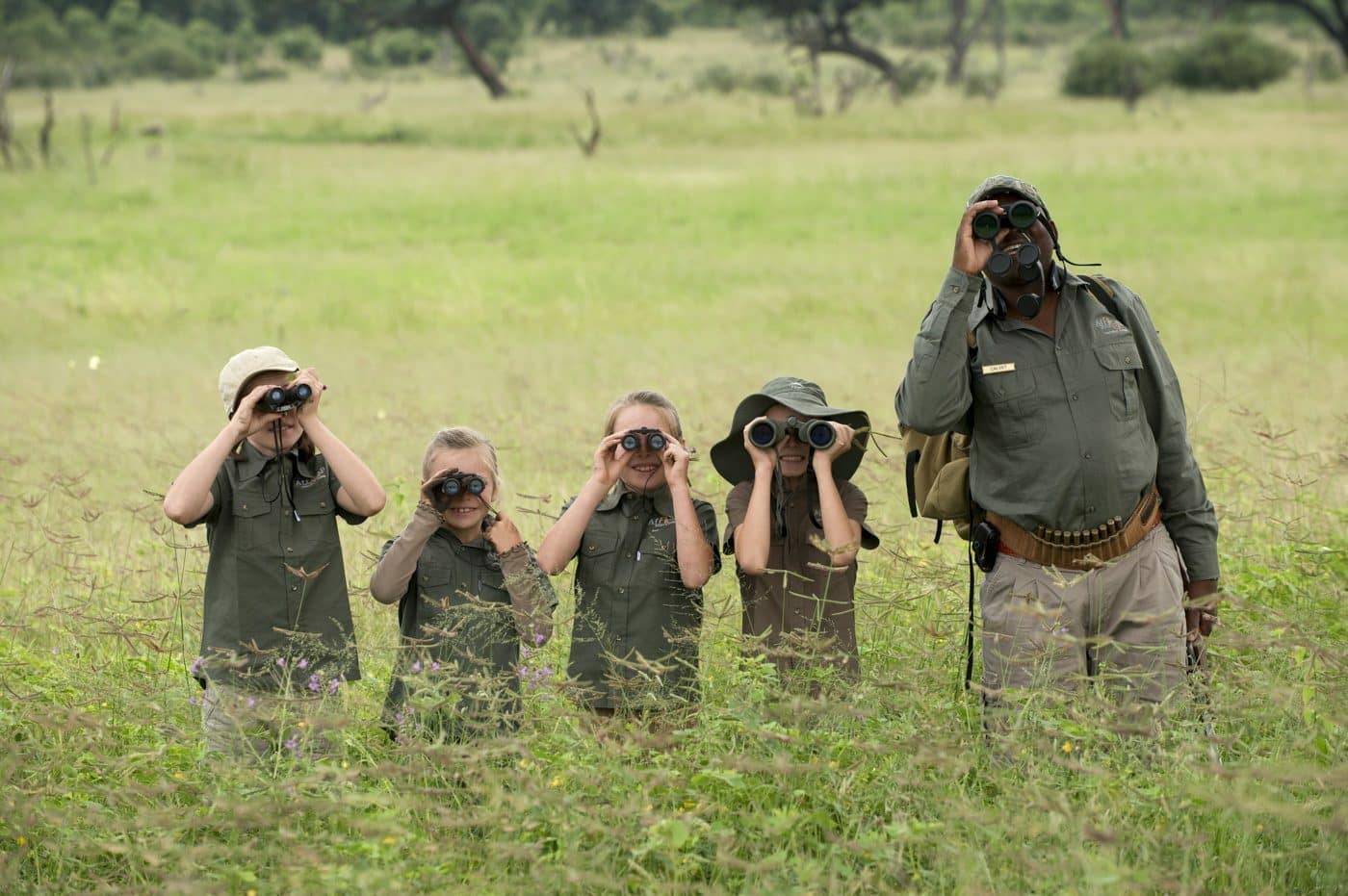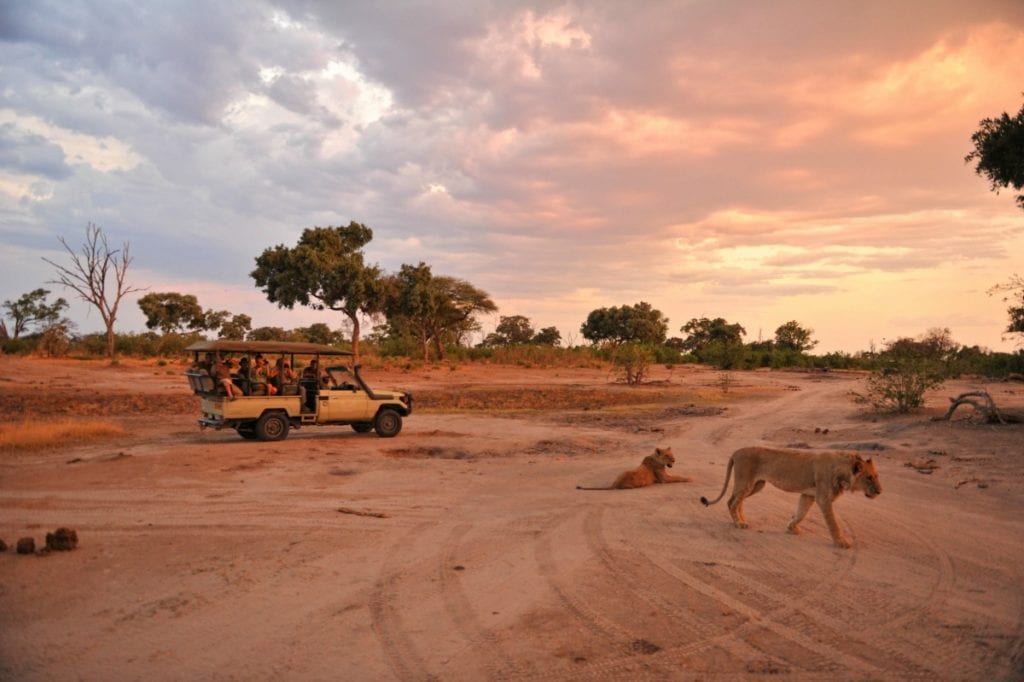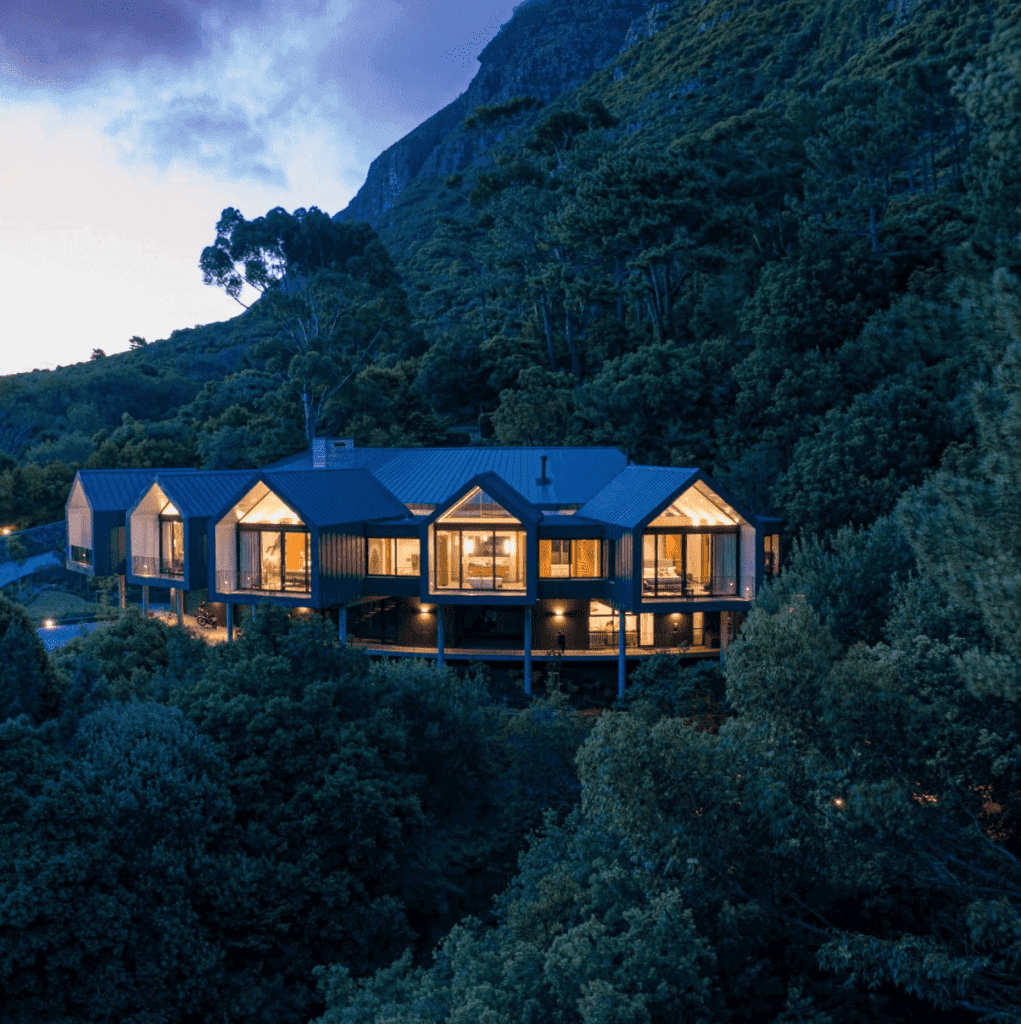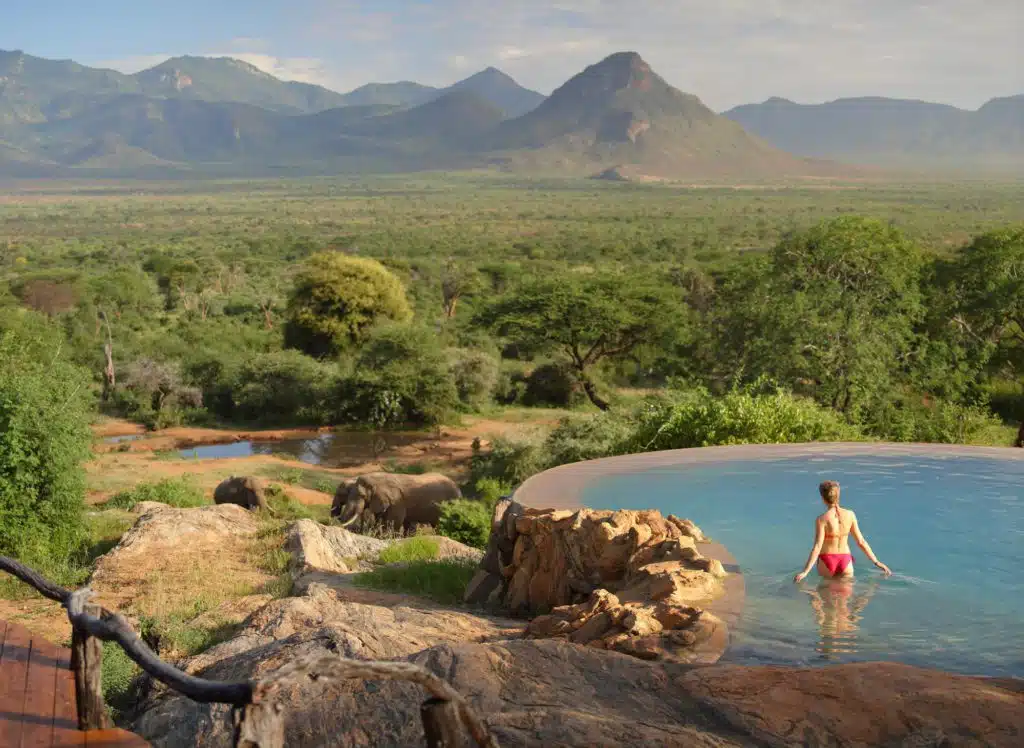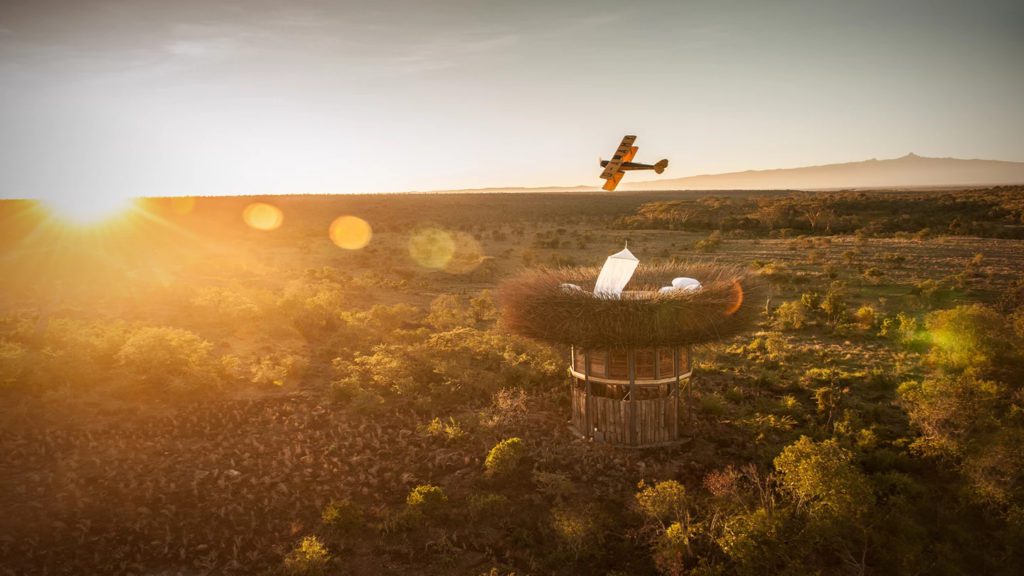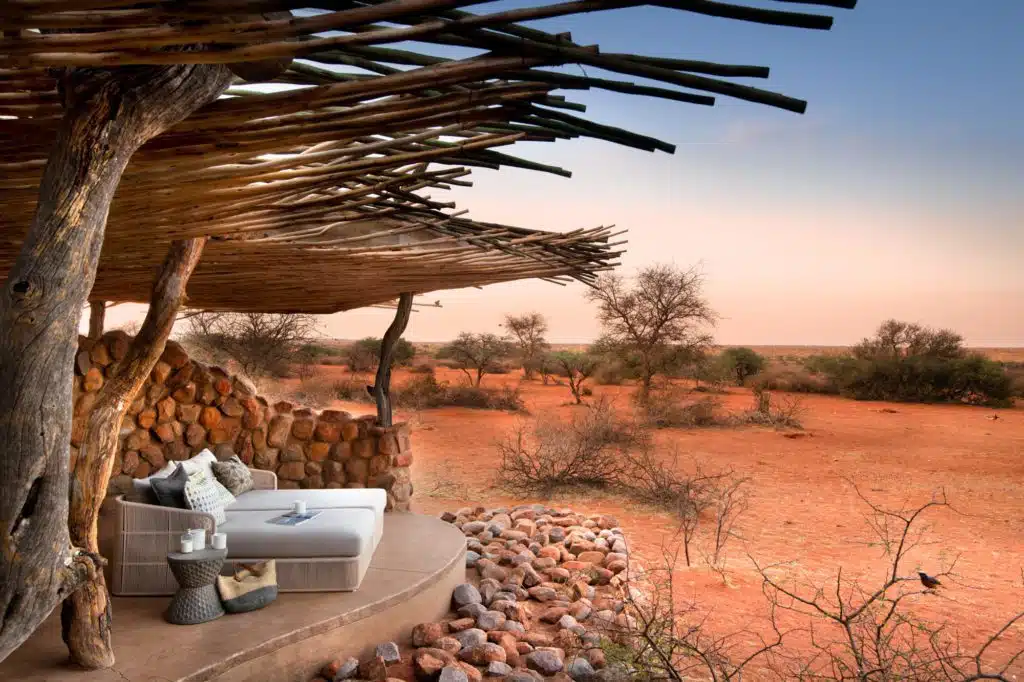THE BALANCE OF CONTRAST
Bumi Hills Safari Lodge, Zimbabwe
Bumi Hills Safari Lodge is confused… in the best possible way.
Founded in the image of the archetypal homestead, it took shape to become a more luxurious contemporary safari lodge whilst maintaining the markings of a rustic, traditionally-inspired property.
On top of this, Bumi Hills embraced its natural setting, set high upon an escarpment overlooking the world’s largest manmade lake, imbuing the safari lodge with a distinctly coastal air. Game drives are punctuated by fishing trips and aquatic adventures, walking safaris with sunset cruises and stargazing and these dichotomies permeate every aspect of design, activity and daily life at one of Zimbabwe’s finest safari lodges.
Confused it may be, but the assimilation of these polarities fuses in perfect union, like opposites attracting or sweet-and-salty popcorn. The truth is, when visiting Bumi Hills this incongruity is far from confusing and barely evident, and its contrasts balance harmoniously for one impeccable, unforgettable and unparalleled experience. Through diversity, Bumi Hills has created luxurious individuality.
BUMI HILLS: The Destination
The private concession of Bumi Hills gave rise to the safari lodge’s multiple identities, the property evolving from necessity and geographical influence. Encompassing a lush promontory on the southern shoreline of Lake Kariba, the concession includes rugged outcrops, coastal frontage and to the south, drier grasslands thriving with nature. Matusadona National Park lies a short distance away, and its open borders allow a superb array of wildlife to migrate through Bumi Hills to the water’s edge, making game viewing equally as variable as the landscape.

Lake Kariba is simply vast when considering that it has been created by mankind’s hand, covering 2,000 square miles (5,200km²) of the valley floor. Diverting water from the Zambezi, the dammed section of river filled the valley in the early 1960s in order to power a hydroelectric station. The locals, however, didn’t view the dam with positivity, their disparaged beliefs giving rise to the lake’s moniker. Kariba, or kariva, in the local Tonga dialect, means ‘trap’ and the region’s profoundly spiritual people believe that the construction separates the serpentine river god, Nyaminyami, from his wife, trapping him on one side of the wall.
Tonga mythology believes that in trying to reach his wife, the serpent god thrashes his tail with such fury that the earth around Kariba shakes and rumbles, as evidenced by the region’s occasional tremors.
Today, the lake is teeming with life, and certainly beneficial fo the local villages, providing work, water and sustenance for the Tonga.
With its superb vantage point and direct water access, the safari lodge also benefits, with elephant sightings, birding and other waterlife viewable within a short distance from the sweeping balconies of the property.
But this is only one environment, and the surrounding countryside provides some of the richest and most diverse game viewing available. The dry season draws wildlife to this permanent water source, while the emerald season sees nature flourish across a wider expanse of wilderness, forests and grassland.
Like very few other destinations, Bumi Hills offers three safaris in a single day, from a walking safari on the dry grasslands to a game drive across the more verdant plains and concluding with waterborne wildlife viewing as the sun descends across the lake’s calm surface.
THE WILDLIFE OF BUMI HILLS
Though not guaranteed or the most fruitful destination, the Big Five can be found in Matusadona National Park and beyond its borders, while hippo, Nile crocodile and large herds of elephant frequent the banks.
Waterfowl, too, is prolific, and a collection of herons, egret, kingfishers and storks flock to the water’s edge, always with a cautious eye to the skies, wary of the region’s several raptor species, including the powerful African fish eagle.
Few animals, save for those that dwell in the lake’s waters, reside on the banks of the river, coming to quench their thirst before departing in search of food, shelter and safety away from the exposed shoreline. This creates an ever-changing wealth of opportunities for wildlife spotters, a continual carousel of creatures ebbing and flowing through the hours of the day and the months of the year.
Though scarce, cheetah have been sighted within the concession, along with a small pack of wild dogs, but their elusiveness is almost absolute. Sharing their fondness for reclusive anonymity, African clawless otters can also occasionally be found peeking above the water’s surface and sliding from the banks in search of fish, of which there are many.
Those with a fondness for rod and reel can find a number of game fish in the voluminous body of water, but all pale in comparison to the mighty tiger fish, and this ferocious catch draws anglers from around the world to Lake Kariba.
BUMI HILLS: The Safari Lodge
From its lofty escarpment vantage point, Bumi Hills Safari Lodge capitalises upon the sweeping panoramic views and glorious, majestic sunsets across Lake Kariba. Each of its 12 villas opens onto a private viewing balcony from which to enjoy the changing colours of the day and even spot wildlife on the shoreline far below.
Incorporating natural materials and traditional building techniques, Bumi Hills infuses rustic nuances with contemporary chic and just a hint of tropical beachside flair, with crisp, white linen drapes gently billowing on the poolside daybeds, the vast expanse of Lake Kariba supplanting the blue horizons of the ocean. From this amalgamation of influences comes a serene equilibrium, combining the classic and the contemporary, the past and the future, the raw aesthetics of nature with the sophisticated elegance of modern design.
In too much modern architecture, the pursuit of modernity disregards the juxtaposition of building and environment. This becomes particularly noticeable when placed in the wildernesses of the world and, though an ultra-modern safari lodge may be wonderfully luxurious and offer an abundance of comfort and facilities, its sterility erects a hermetic barrier between residence and nature.
This is the antithesis of the Bumi Hills experience, and its use of natural elements creates a seamless transition from elegant interior to the unfettered wilderness beyond. From its confusion of influences, Bumi Hills has created perfect harmony.
There are several options available to the visitors of this impeccable safari lodge, from private ensuite villas, each with its own balcony, to the two-bedroomed Baobab Villa, ideal for families and replete with living room, bar and indoor and outdoor dining decks. The Baobab is also Bumi Hills’ shining showpiece of its outstanding level of bespoke service and attention to detail. A private staff includes a personal butler and exclusive guide with a state-of-the-art safari vehicle at the residents’ disposal.
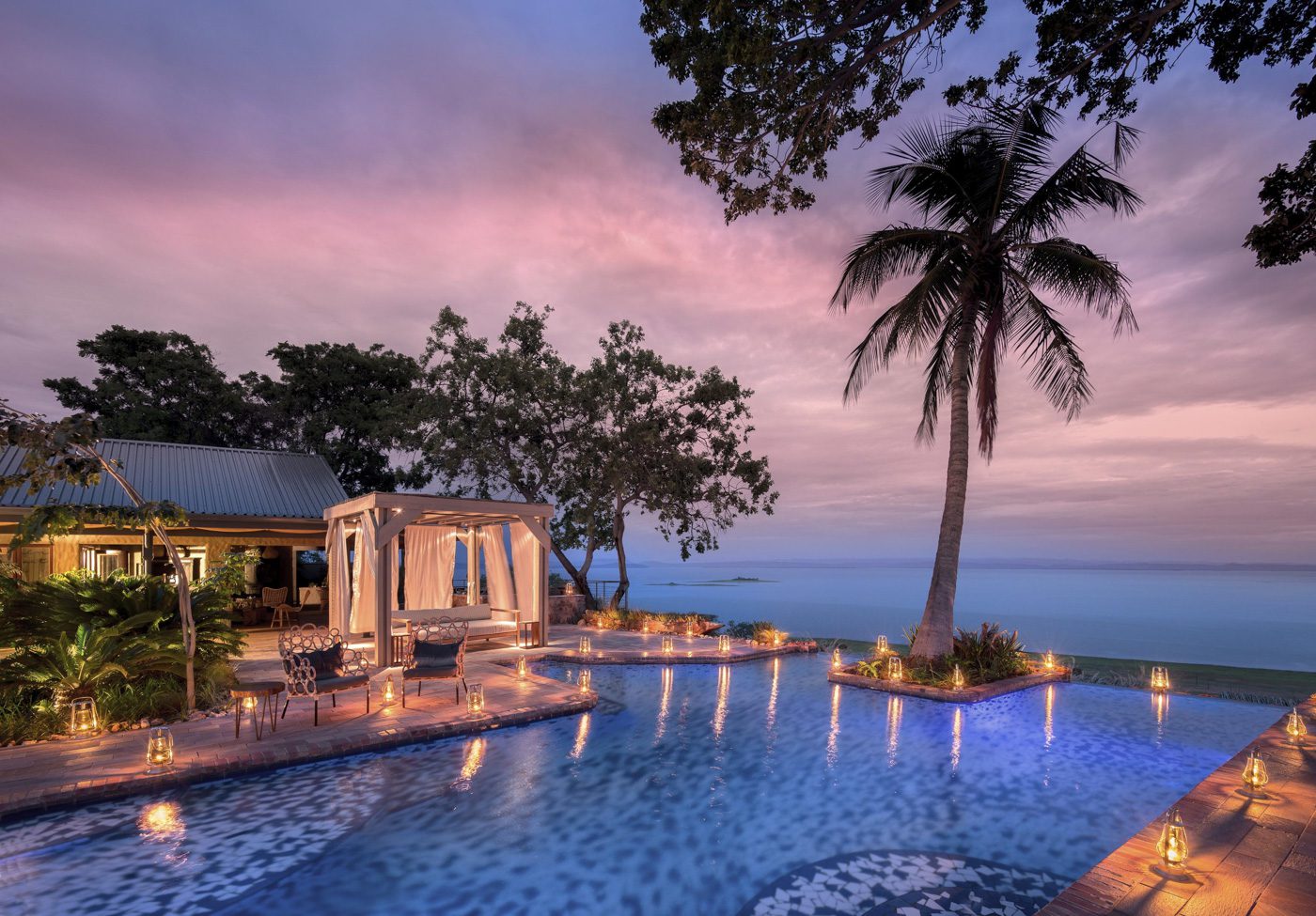
As with much at Bumi Hills, a stay takes on several perspectives. Each suite is wonderfully secluded and guests are free to enjoy their privacy throughout their stay. Communal areas, including the property’s restaurant and breathtaking infinity pool, allow visitors to comingle, meet fellow guests and share stories of the day’s adventures.
This balance makes each stay exquisitely personal and yet socially inspiring, the safari lodge’s small occupancy allowing each party to share their stay mutually if they wish.
Though some areas of Zimbabwe have experienced significant growth through tourism, the greater Kariba region remains sublimely remote and underdeveloped. This, coupled with the property’s faultlessly impeccable standards, makes Bumi Hills possibly the premier residence for a Zimbabwe safari, and this is only enhanced by expert guiding, a spectrum of abundant wildlife, changing ecosystems and world-class staff throughout.
ACTIVITIES IN BUMI HILLS
From this collection of environments comes a varied portfolio of activities covering a gamut of interests.
On arrival, the magnetic draw of the immense Lake Kariba is palpable. It pervades every moment, reflecting the spectrum of colours from the sky above, drawing nature to its shores and gracing the views from almost every window and balcony. Aquatic pastimes are predominant in the daily adventures of Bumi Hills, and with such an incredibly unique ecosystem so close at hand, boat safaris, sunset cruises and fishing excursions are always available.
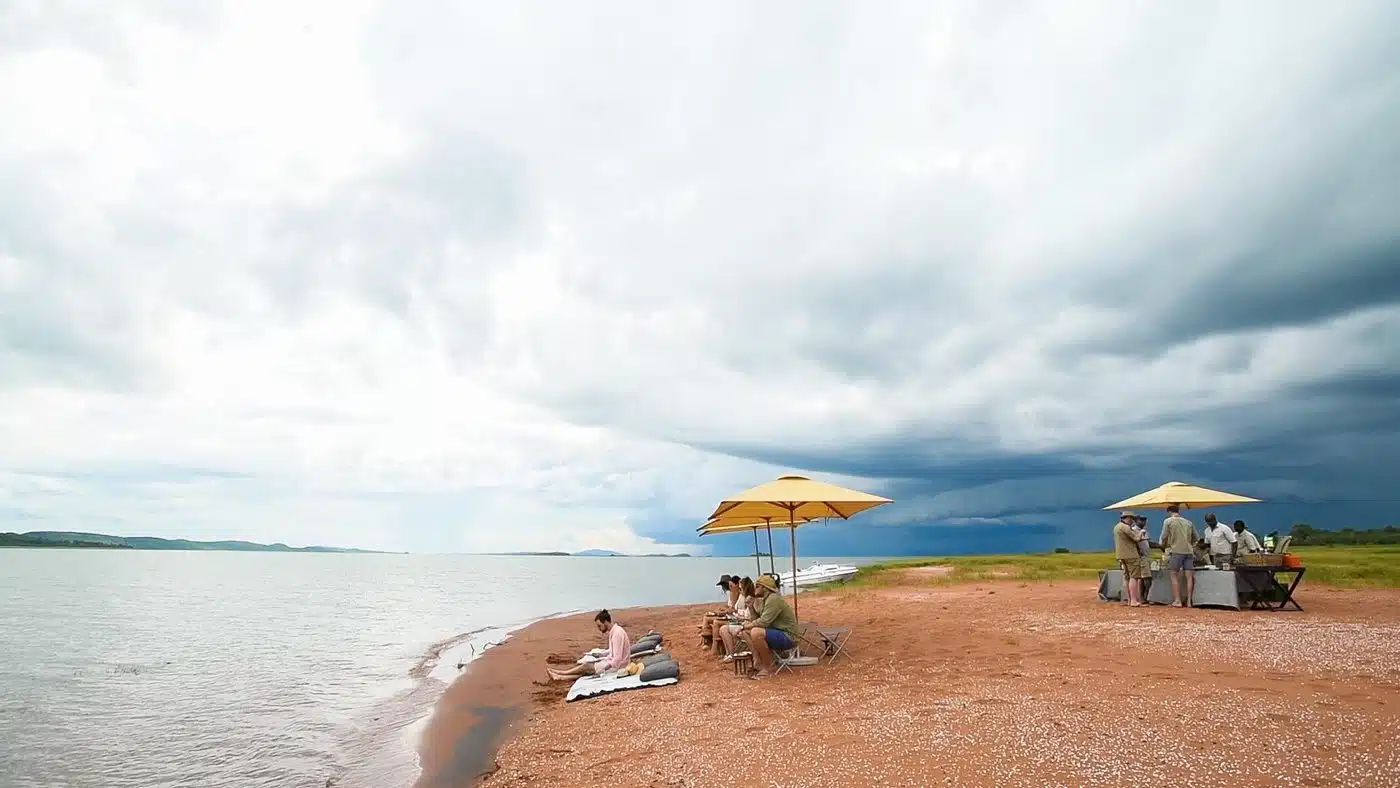
Adventure is found not only by water, but also by foot. The attraction of the lifegiving lake draws wildlife from near and far and this can best be observed on a walking safari along the water’s edge. Baby elephants are guided by their mothers through the shallows, immense Nile crocodiles peer ominously from the depths watched vigilantly by antelope slaking their thirst and a spectrum of birdlife wades, swoops, flocks and sings in the sky and on the shore. Zimbabwe is a paradise for avid hikers and the walking safaris available here, especially through the private concession, reveal changeable landscapes and a continual variety of life, and all within a stroll from the property’s front door. Diversifying further still, Bumi Hills is one of the few African destinations in which you can view the signs of creatures of a very different nature. Stepping from the lake and further into the bush, it is possible to uncover the prehistoric remnants of dinosaurs, the ancient beasts, like their evolutionary ancestors, once drinking from the Zambezi and leaving their tracks and bones in the mud at its banks.
On the lake’s surface, one can gain new perspective of life on the shoreline, and boats are able to venture to the more remote farther banks to observe more timid and elusive species. However, one of the most dramatic of creatures lurks beneath the surface, and the lake is renowned for its population of the fierce and feisty tiger fish. Said to be one of the most dynamic and challenging game fish the tiger, with its distinctive, needle-like protruding teeth, is a remarkable quarry for passionate anglers and fishing newcomers alike. Though strictly catch-and-release, an afternoon on the water pursuing the mighty tigerfish is as tranquil as it is enthralling.
With Hwange National Park and the iconic Victoria Falls to the west and Mana Pools National Park to the east, the adventures to be found further afield are copious, but the private concession and neighbouring Matusadona National Park offer incredible opportunity for game drives and walking safaris closer to home.
The beauty of its private concession is precisely that: its privacy. Where the area may be diminished, the opportunity is increased; opportunity to spot more animals within a smaller space, opportunity for multiple drives at dawn, dusk and into the night, and opportunity to spend greater periods of time waiting, watching and photographing wildlife.
Though open to the general public, Matusadona remains one of Africa’s lesser-known parks and game vehicles are thankfully minimal. In 1958 Matusadona was proclaimed a non-hunting reserve, protecting the wildlife and helping it to thrive. Black rhino, cheetah, leopard, wild dogs, eland, roan and sable can – although rare – all be sighted within Matusadona and the hope is that with the park’s protection, numbers of these threatened species will only increase.
Taking guests of all ages into account, Bumi Hills’ Ngwana Cubs’ Club gives children plenty to keep them entertained, and subliminally educated! From cultural arts and crafts to culinary school, children can also learn from guides and staff about the region’s wildlife and the bush skills of the Tonga people.
Experienced staff will escort youngsters on educational bush walks, finding signs of life, creepy crawlies and useful plants endemic to Zimbabwe, while parents and guardians can enjoy Bumi Hills’ indulgent spa, exercise in its well-appointed gym or simply unwind next to the pool and a chilled gin and tonic.
FINDING CULTURE
The Tonga people of the nearby Chalala and Mola communities have resided in the region for centuries, their lifestyles largely unchanged, despite the significant impact that the dam and creation of Lake Kariba would undoubtedly have had.
Subsisting on what can be harvested from the surrounding environments and supplemented with a small amount of pastoral farming, the Tonga uphold the traditions of the forebears and, while certain influences from the modern world have filtered into the villages, running water and mains electricity aren’t among them.
Supporting these communities in several ways, the safari lodge hosts visits to the villages with whom they have developed a significant rapport and mutual respect.
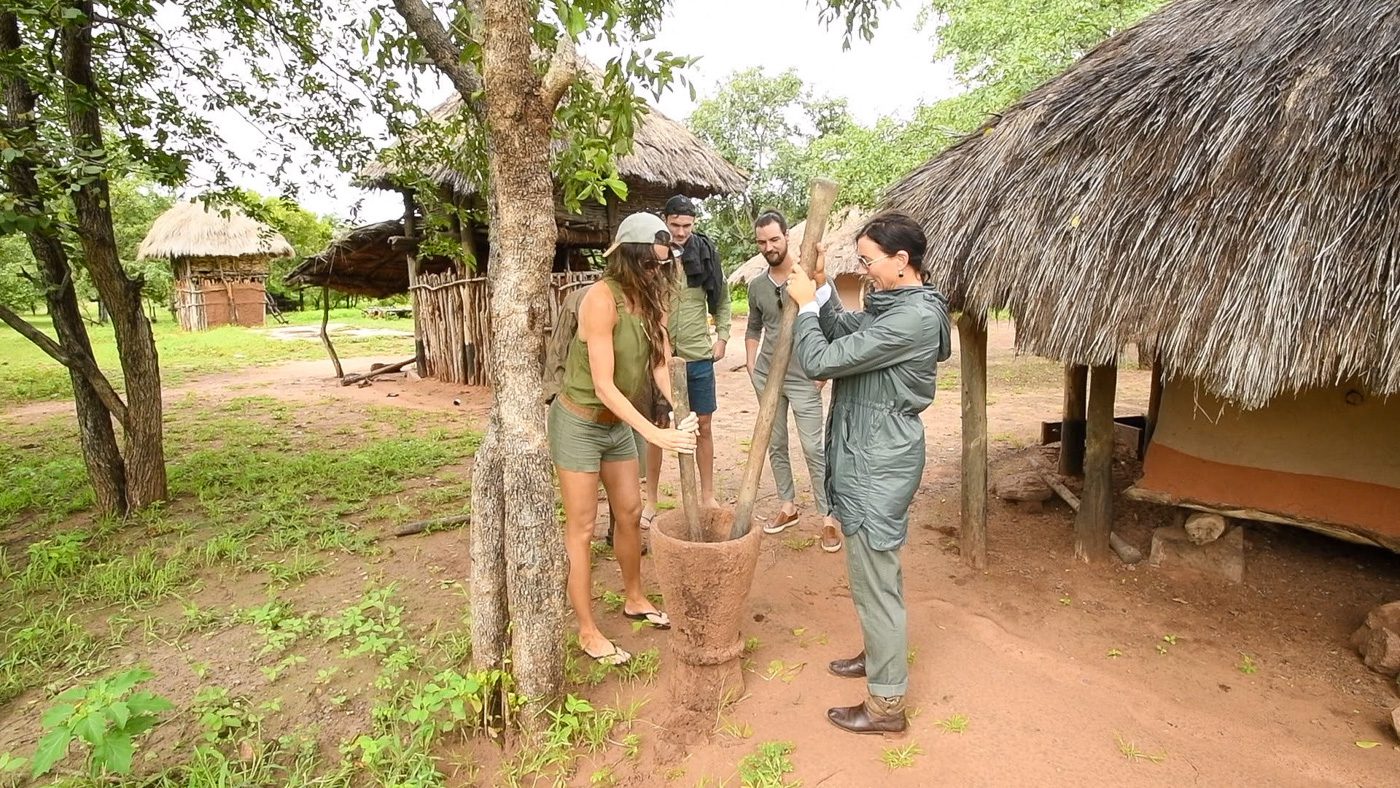
With their semi-permanent homes and villages, and their warm hospitality, the Tonga encapsulate and reflect the ways of their ancestors more tangibly than is found almost anywhere else. A window into the past and an observation of a deeply spiritual people unchanged by the continual evolution of the West, this is an immersive experience that is as unforgettable as it is fascinating and educational.
Though its influences may come from numerous sources, in time, culture and environment, Bumi Hills’ confusion begins and ends here. One cannot pinpoint its distinct style or pigeonhole it into some constrictive genre or package, but the safari lodge has firmly cemented its place as one of Zimbabwe’s foremost properties.
Its unwavering commitment to conservation, community and customer satisfaction is comprehensive, its luxury lucid and pervasive, its far-flung ingredients unified in an exceptional creation of a bespoke property that is at once serenely homely and acutely elegant.
Bumi Hills is a world that is yours alone, a collaboration of elements that will fill days with varied wonder with explorations of a continually-changing canvas, providing such attentive service as to eliminate every ounce of confusion that this might well be one of the world’s most impeccable lakeside escapes.

